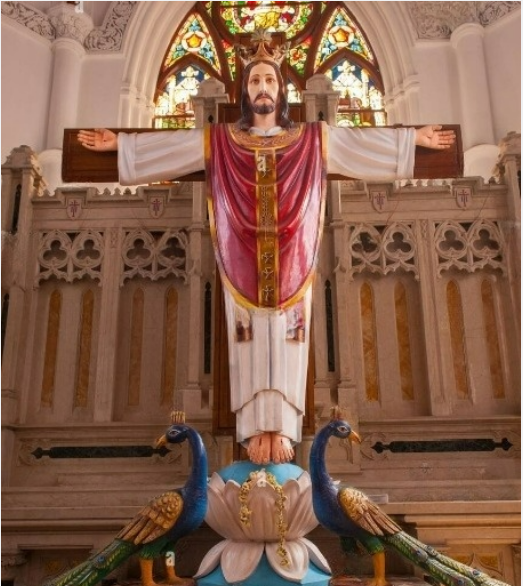ALL HAIL THE KING CRUCIFIED
- Charles
- 25 nov. 2023
- 4 min de lecture
Reflections on the Solemnity of Our Lord Jesus Christ, King of the Universe (Ezekiel 34:11-12, 15-17, 1 Corinthians 15:20-26, 28, Matthew 25:31-46)

As citizens of the twenty-first century, privileged to be living in a ‘free world’ governed by democracies and republics, how do we make sense of an archaic and outdated title such as Christ the King? Does the kingship of Christ still mean something in this day and age? The greatest relevance of Christ’s kingship is perhaps in the way it stands apart from past or present human models of ‘kingship’. Jesus never really claimed to be an earthly king: “My kingdom is not of this world” (John 18:36), he said and insisted that “He came to serve, not to be served” (Matthew 20:28, Mark 10:45). To Pilate, who presses him on the matter, he replies categorically, “You say that I am a king. Actually, I was born and came into the world to testify to the truth” (John 18:37), a statement which only adds to Pilate's perplexity on the matter.
Paul, in the second reading today, provides us the key to enter into the meaning of Christ’s kingship. He relates the authority and power of Christ’s kingship to the mystery of his passion, death, and resurrection. It is in the passion and crucifixion of Jesus that the nature of God’s kingdom is truly clarified. This paradox of Christ’s kingship is resolutely demonstrated on the inscription that Herod had written and put on the cross: “Jesus of Nazareth, the King of the Jews” (John 19:19). The crucified King was subjected to derision and mockery, crowned with thorns and left hanging on a cross. The Cross is indeed the place of elevation where Jesus "draws all humanity to himself" (John 12:32). The king reign from and on the Cross. Jesus, the king and the chief protagonist of God’s kingdom story is not to be found on a movie screen. He is in the room, with the spectators. He is involved in the story with us.

The Church is a kingdom of people continuing to look deeply into the wounds of the pierced king” (Zechariah 12:10, John 19:37), bearing witness, holding and affirming its identity and mission in its gaze on Jesus. The Church does not imagine or theorize an ideology of a model kingdom or society. It learns the true nature of God’s kingdom from the reality of the Cross that continues to reveal it today in our humanity, which continues to be humiliated, pierced, and disfigured. This is why the Son of Man, in the Gospel, reveals a strange set of criteria for admission into his kingdom: did you feed the hungry, give a drink to the thirsty, clothe the naked, welcome a stranger, care for the ill, or visit a prisoner? The first reading, similarly, describes God’s kingship as the care of a shepherd for the started, the injured, and the sick sheep of his flock.

Christ’s kingship is thus best manifested in our wounded humanity. Consequently, the Church’s witness to this kingdom reality is best demonstrated in its ministry to its king, who is best served when we reach out to one of the least of his brothers or sisters. Saint Vincent de Paul called the poor “our masters” because it is in them we discover the King of Glory veiled in humility. The glory of the resurrection is closely connected with the passion of the cross. Christ, our king continues to challenge the dangerous temptation to compromise with the powers of this world in order to better promote the reign of religion! The Kingdom of Christ, while present in the heart of this world ‘here and now’ does not belong to this world nor does it “come from this world" (John 17:16). The kingdom is a reality that is “within” us and “among” us (Luke 17:21).

This Kingdom is not constituted by a hierarchy of ministers, soldiers, or officials, but by sons and daughters. The “children” of the Kingdom, as Jesus calls them, are those who seek the truth, those who follow the path of love, justice and peace. We are the ambassadors of this Kingdom and our duty is not to use the feast of Christ the King as a pretext to fuel dreams of a militant Christianity or a triumphalist Church. Our call is to make the Kingdom present here and now in the concrete reality of our lives through our every patient listening, every encouraging smile, every shared burden, every respectful and loving glance, and our every gesture of peace and reconciliation. The kingdom that Christ inaugurated continues to take shape in the concrete reality of our own lives, in the midst of the miseries and hopes of the present day.
Let’s celebrate Christ the King, who does not wish to cling to the power of kingship but continues to empty himself taking the form of the poor, the thirsty, the stranger, the naked, the sick, and the prisoner, to reveal the mystery of his continuing passion, death, and resurrection, so that we, the ‘children’ of his kingdom can continue to gaze into the power of this saving mystery in our active ministry for the least of his brothers and sisters. Let us hail the crucified King!




Commentaires